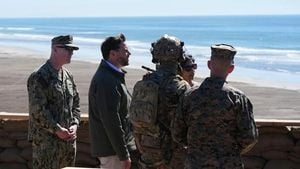The air is thick with urgency and resolve at the 29th UN Climate Change Conference, or COP29, held in Baku, Azerbaijan. This year's summit has been designated as one of the most pivotal since the inception of these climate meetings, with representatives from around the world gathering to confront what many foresee as the defining problem of our time—the climate crisis. With severe weather events becoming more frequent and destructive, participants are highlighting the immediate need for transformative actions and substantial financial commitments to combat climate change.
During the opening ceremony, COP29 president Mukhtar Babayev spotlighted two significant priorities: advancing climate finance and establishing high-integrity carbon markets. Babayev stated, "We are on the road to ruin. Whether you see them or not, people are suffering in the shadows. They are crying out for leadership and action." These emphatic words set the stage for discussions focused on the delicate yet pressing nature of climate action needed to avert catastrophic climate impacts.
It’s no secret—this year is projected to be one of the hottest on record, with predictions estimating global temperatures could rise by 1.5 degrees Celsius above pre-industrial levels within the next few years. This alarming trend demands immediate reductions in carbon emissions, as emphasized by the UN's latest reports, which assert the world must slash emissions by 42% by 2030 to stay within the 1.5°C limit. "Signs of climate disasters abound: hurricanes, droughts, and floods are already here and hurting," Babayev remarked, underscoring the worsening conditions exacerbated by climate change.
Perhaps one of the most discussed subjects at COP29 is climate finance—the funds allocated to help developing nations mitigate and adapt to climate impacts. Numerous speeches have alluded to the responsibility of wealthier nations to support these efforts, laying out expectations for new financial pledges to facilitate the transition to clean energy systems. The UN Climate Chief, Simon Stiell, urged nations to collaborate on this pressing issue, saying, “Let’s dispense with any idea of climate finance as charity; it’s about our shared future.” He emphasized the necessity of renewed financial commitments to enable progress.
Maryna Ovtsynova, president of the ALLATRA international public movement, echoed these sentiments, stating, “We don’t realize how close we are to the point of no return.” Addressing the assembly, she highlighted the dire situation facing the planet, where pollution levels are at an all-time high and the global community must act now to avert disaster.
The question remains: How much financial support is truly necessary? Expectations suggest discussions around ambitious targets of $5 trillion annually for climate finance, as proposed by key activists and participants at the summit. This funding is envisioned to not only assist vulnerable nations but to also provide technological and infrastructural support necessary for reducing reliance on fossil fuels.
Amid these urgent proclamations, COP29 has also become a platform for addressing other climate-related issues, such as carbon market integrity. High-integrity carbon markets are seen as pivotal mechanisms to incentivize emissions reductions effectively. Critics caution, though, against allowing these markets to become mere greenwashing tools without real-world benefits, illustrating the need for stringent regulations to guide their implementation.
The significance of this moment resonates deeply with various global leaders and environmental advocates. With geopolitical tensions still very much alive, including issues plaguing Ukraine and Israel, the challenge will be uniting nations to fight for the planet amid discord. COP29’s backdrop of continuous conflict seems to underline the difficulties facing international climate cooperation.
Still, hope springs eternal. Participants at the summit reflect on shared dreams and visions for stable futures. Jacob Johns, from the Hopi and Akimel O’odham communities, remarked, "Within sight of the destruction lies the seed of creation. We have to realize we are not citizens of one nation; we are Earth. Our survival depends on collective action."
The Green Zone initiative at COP29 has drawn crowds eager to learn, engage, and mobilize for climate action. Workshops and exhibitions throughout the venue provide avenues for innovative ideas and sustainable practices, showcasing advancements made by various organizations and countries. For example, the European Bank for Reconstruction and Development (EBRD) is initiating projects to fund renewable energy sources, with funding and plans already laid out.
International experts indicate the urgent need to create more inclusive negotiations where developing nations are not only considered as beneficiaries but also partners. They advocate listening to voices from the Global South, who often bear the brunt of climate catastrophes, and whose insights can help shape meaningful climate policy.
But amid the preamble of formal declarations and proposed agreements, the clock is ticking. COP29 has approximately two weeks to catalyze action and create substantial agreements. While many are cautious, the overarching belief is clear: We cannot leave Baku without significant outcomes. This summit, perceived as the final tipping point for decisive climate action, demands global unity like never before.
Let’s not forget: every delay costs lives and undermines future generations. The decisions made here will echo through decades. The world is watching, and the urgent call to action resonates—will countries rise together to create the climate finance framework necessary to avert global disaster and preserve life on Earth? Only time, and the resolve to act, will tell.



